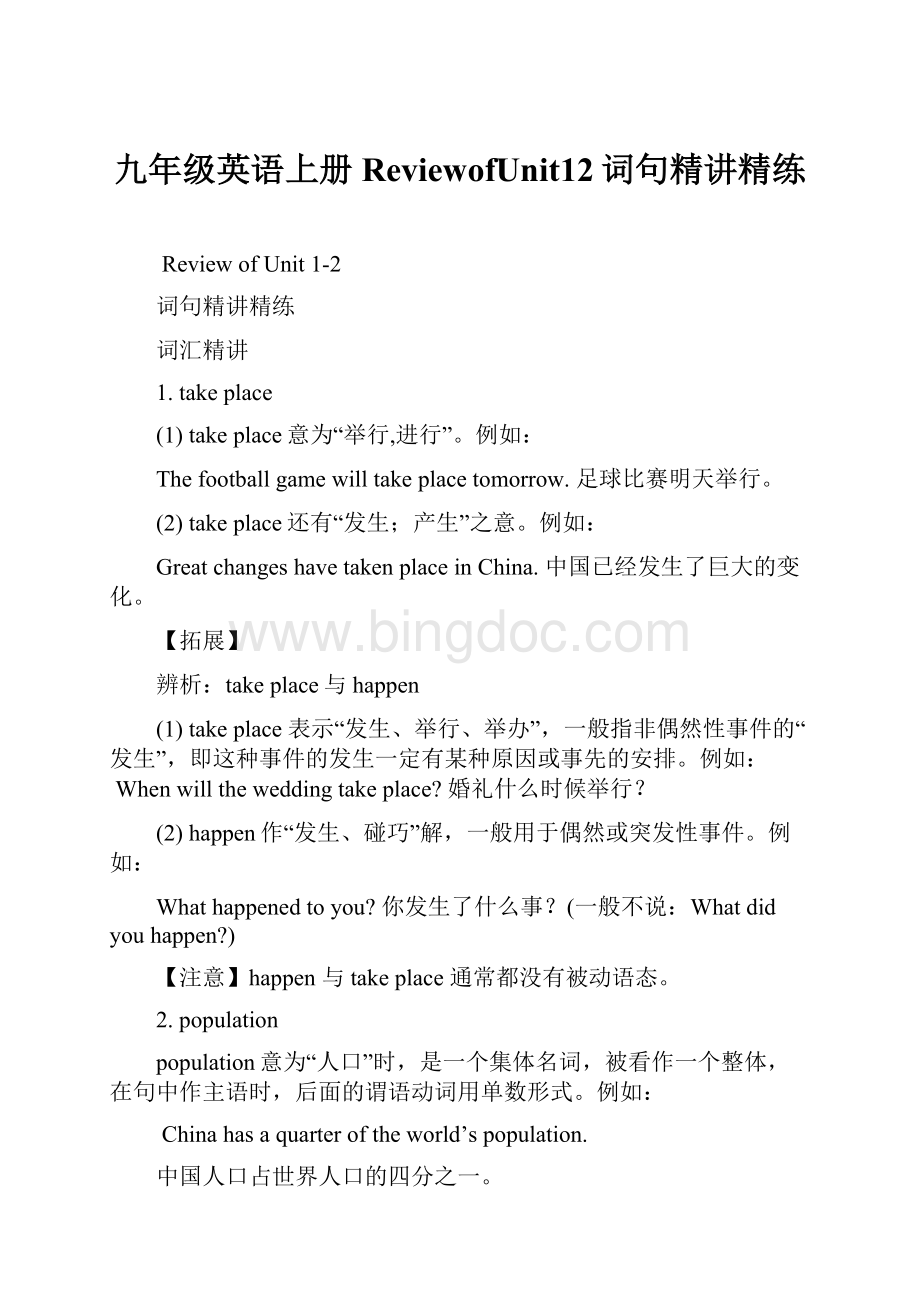九年级英语上册ReviewofUnit12词句精讲精练.docx
《九年级英语上册ReviewofUnit12词句精讲精练.docx》由会员分享,可在线阅读,更多相关《九年级英语上册ReviewofUnit12词句精讲精练.docx(18页珍藏版)》请在冰点文库上搜索。

九年级英语上册ReviewofUnit12词句精讲精练
ReviewofUnit1-2
词句精讲精练
词汇精讲
1.takeplace
(1)takeplace意为“举行,进行”。
例如:
Thefootballgamewilltakeplacetomorrow.足球比赛明天举行。
(2)takeplace还有“发生;产生”之意。
例如:
GreatchangeshavetakenplaceinChina.中国已经发生了巨大的变化。
【拓展】
辨析:
takeplace与happen
(1)takeplace表示“发生、举行、举办”,一般指非偶然性事件的“发生”,即这种事件的发生一定有某种原因或事先的安排。
例如:
Whenwilltheweddingtakeplace?
婚礼什么时候举行?
(2)happen作“发生、碰巧”解,一般用于偶然或突发性事件。
例如:
Whathappenedtoyou?
你发生了什么事?
(一般不说:
Whatdidyouhappen?
)
【注意】happen与takeplace通常都没有被动语态。
2.population
population意为“人口”时,是一个集体名词,被看作一个整体,在句中作主语时,后面的谓语动词用单数形式。
例如:
Chinahasaquarteroftheworld’spopulation.
中国人口占世界人口的四分之一。
【拓展】
(1)当表示一个城市、地区或国家有多少人口时,常用以下两种结构,即“thepopulationof+某地+is+数词”或“某地+hasapopulationof+数词”。
例如:
ThepopulationofLondonisovertenmillion.
=Londonhasapopulationofovertenmillion.伦敦的人口超过一千万。
(2)population可与large,small搭配,但不能与many,few搭配。
例如:
Thecitywithitslargepopulationhasbecomecrowded.
这个人口众多的城市变得拥挤不堪了。
(3)询问人口数量常用what或howlarge。
例如:
What’sthepopulationofthecity?
=Howlargeisthepopulationofthecity?
这个城市有多少人口?
(4)population前有修饰词,如分数、百分数时,表示整体人口中的一部分,谓语动词有用复数形式。
例如:
Onehalfofthepopulationofthecityarefarmers.这个城市的一半人口是农民。
3.offer
(1)offer是动词,意为“主动提供”。
例如:
Theywillofferdrinksduringthemeeting.会议期间他们将提供饮料。
Theyoungmanofferedanoldmanhisownseat.
=Theyoungmanofferedhisownseattoanoldman.
那个年轻人把自己的座位让给了一位老人。
(2)offer的常见搭配:
offertodosth.主动提出做某事
offersb.sth.=offersth.tosb.向某人提供某物 例如:
Heofferedmeaglassofwine.他端给我一杯酒。
4.satisfy
(1)作动词,意为“使满意,使高兴;使满足”。
例如:
Thatanswerwon’tsatisfyher.那个回答不能令她满意。
Ourcompanywilldoeverythingtosatisfyourcustomers.
我们公司将尽一切努力令顾客满意。
(2)作动词,意为“符合,达到(要求,标准等)”。
例如:
Youcan’tapplyforthejobuntilyouhavesatisfiedcertainconditions.
符合某些条件前,你不能申请这个工作。
【拓展】
(1)satisfied作形容词,意为“满意的”。
常放在系动词后面作表语。
例如:
Herpridewassofullysatisfied.
她的虚荣心得到了如此充分的满足。
Sheseemedprettysatisfiedwiththeresult.
她对那结果似乎相当满意。
Ifeltquitesatisfiedaftermybigmeal。
这顿大餐,我吃得很满意。
(2)常用短语搭配:
besatisfiedwithsth.意为“对……很满意(主语为人)”。
例如:
Theteacherissatisfiedwithherhomework.
老师对她的作业很满意。
ItoldmyselfIwouldbesatisfiedwithwhateverIcouldget.
我告诉自己,不管得到什么我都会心满意足的。
Oneshouldn’tbesatisfiedwithonlyalittlesuccess.
一个人不应该只因一点小成就而感到满足.
5.success
success表示抽象意义的“成功”,是不可数名词;表示具体意义的“成功的人或事”,则是可数名词。
例如:
Failureisthemotherofsuccess.失败是成功之母。
Hisnewbookwasagreatsuccess.
他新出版的书获得了巨大成功。
【拓展】
(1)succeed表示“成功”,是不及物动词;表示做某事成功了,succeed后通常接(in)doingsth。
例如:
Hisplansucceeded.他的计划成功了。
Atlasthesucceededinsolvingtheproblem.他终于把那个问题解决了。
Shesucceededin(passing)theexam.她考试及格了。
(2)successful作形容词,意为“成功的”。
例如:
Theperformancewassuccessful.演出很成功。
Itwasasuccessfulexperiment.那是一次成功的试验。
6.encourage
encourage用作及物动词,意为“鼓励;鼓舞;促进;助长”等,常用于以下结构:
encouragesb.todosth.意为“鼓励某人做某事”。
例如:
Theteacheroftenencouragesustostudyhard.老师经常鼓励我们要努力学习。
Mymotherencouragedmetoenterthecontest.
妈妈鼓励我参加那场比赛。
【拓展】
(1)encouragesb.insth.意为“在……方面鼓励/助长某人”。
例如:
Don’tencouragehiminlaziness.别助长他的懒惰行为。
(2)encouragement是encourage的名词形式,意为“鼓舞/鼓励”。
例如:
Theteacher’swordswereagreatencouragementtohim.
老师的话对他是极大的鼓舞。
7.pollute
pollute为及物动词,意为“污染,弄脏”;pollution为pollute的名词形式,意为“污染”,是不可数名词。
例如:
Weshouldnotpolluteourriverswithwaste.
我们不应让废弃物污染我们的河川。
Pollutionisabigproblem.污染是个大问题。
【拓展】
含pollution的习惯用语:
airpollution空气污染noisepollution噪音污染
8.create
create作动词,意为“创造,创作,创建”。
例如:
Godcreateshumanbeings.上帝创造了人类。
Anartistshouldcreatebeautifulthings.一个艺术家应该创造美丽的东西。
Itispeoplewhocreatehistory.是人民创造了历史。
【拓展】
creative作形容词,意为“有创造性的,有创意的”。
例如:
Yogareleasesthecreativepotentialinlife.
瑜伽释放出生命中创造的潜力。
Paycloseattentiontoyourowncreativeideas.
时刻关注自己创造性的想法。
9.discover
discover是动词,意为“发现”,其后可接名词、代词、疑问词+不定式及that从句等。
例如:
Weneverdiscoveredhowtoopenthebox.
我们从未弄清楚如何打开这个盒子。
【拓展】
(1)discover意为“发现”,指有意或无意地发现已经存在尚不为人知的事物。
例如:
ChinahasdiscoveredoilundertheSouthChinaSea.
中国在南海发现了石油。
(2)find意为“找到、发现”,指偶然发现或经过一番寻找,找到值得或所需的东西,强调找的结果。
例如:
IfoundthebookIwaslookingfor.我找到了一直在找的书。
(3)findout意为“查明白、弄清楚”,多用于经过调查、分析、研究等手段查出的情况,查出的东西往往是抽象的,如时间、事实、真相等。
例如:
Pleasefindoutwhenthemeetingstarts.请查一下会议什么时候开始。
(4)invent意为“发明”指经过研究、设计而创造出原本未有的东西。
例如:
CaiLuninventedthepaper.蔡伦发明了纸。
10.rise
(1)rise是不及物动词,意为“上升,上涨”。
例如:
Thesunhasnotyetrisen.太阳还没升起。
Thepopulationofthecityhasrisentofivemillion.
城市人口已增加到五百万。
(2)rise还表示“起立;起床”。
例如:
Heroseandlefttheroom.他站起身走出屋去。
Ihavetoriseearlytomorrowmorning.我明天必须早起。
【拓展】
(1)raise是及物动词,意为“举起,抬起”。
例如:
Heraisedhisglassandsaid,“Yourhealth,Carl.”
他举起了杯子说道:
“祝你健康,卡尔”。
Ifyouwanttoaskaquestion,firstraiseyourhand.
如果你要问问题,请先举手。
(2)raise还表示“招募,筹集”。
例如:
Theyaregoingtoraisefundsfortheschoolbuildings.
他们将为盖校舍筹集资金。
Thefoolishprinceraisedanarmyagainsthisfather.
那个愚蠢的王子招募军队反对他的父亲。
(3)raise还表示“提高(音量、某种水平)”。
例如:
Theticketpricewasraisedto30yuan.票价上升到了30元。
Thespeakerraisedhisvoicesothatwecouldhearhim.
演讲者提高了声音,以便我们都能听到。
词汇精练
I.英汉词组互译。
1.takeplace_____________2.跟……保持联系_____________
3.取得进步____________4.succeedindoingsth.____________
5.采取措施做某事___________6.sofar___________
7.幸亏,由于___________ 8.asamatteroffact_________
9.故意,有意地__________10.accordingto___________
II.根据句意及汉语提示补全句子。
1.Luck52thepeoplewhowanttoshowthemselves______(给……提供)agoodstage.
2.(多亏)themoderncommunications,wecankeepintouchwithourfriendsandrelativesfarawayeasily.
3.Chinahasgreat(取得进步)insendingman-madesatellitesintospace.
4.Ournewheadmasterlooksveryyoung.Ithinkheis(少于)thirtyyearsold.
5.MikeisweakinEnglish.Inorderto(赶上)others,Mikeworksharderthanbefore.
III.根据句意,选择单词或短语填空。
agreement,asaresult,andsoon,atpresent,inthepast
1.__________tenyears,myhometownhaschangedgreatly.
2.—Whatsportsdoyoulike?
—Ilikeplayingbasketball,playingtabletennis,playingfootball,running__________.
3.LiHongstudiesEnglishharderthanbefore.__________,shehasagoodmark.
4.I’mafraidIcan’thelpyou__________,becauseI’mtoobusy.
5.Thegrandchildnodshisheadtoshowhis__________tohisgrandpa.
IV.短文填空。
阅读短文,用方框内所给单词的正确形式填空,使短文意思通顺、完整。
(有多余词)
express,close,speak,open,be,practice,has,take,clear,try,understand,bring
ManyChinesestudentsdon’tpaymuchattentionto1Englishatschool.Theythinkitnecessary2speakingEnglishinclass,butnotoutofclass.HereisastorytoshowyouhowimportantitistospeaktheEnglishlanguagefreelyineverydaylife.
AforeigneroncegothungryandwentintoarestaurantinLondon.Hesatdownatatable.Whenthewaitercame,he3hismouth,puthisfingersintoitandtookthemoutagaininorder4thathewantedsomethingtoeatforhecouldnotspeakEnglish.Thewaitersoon5acupoftea.Themanshookhishead.Thewaiterthen6awaytheteaandbroughtacupofcoffee.Themanagainshookhishead.He7againandagain,buthewasn’tabletomakethewaiter8him.However,whenanothermancamein,hespokeEnglish9andfluently.Inafewminutes,there10alargeplateofmeatandvegetablesonthetablebeforehim.
【参考答案】
I.英汉词组互译。
1.发生,进行2.keepintouchwith
3.makeprogress4.成功做了某事
5.takemeasurestodosth.6.到目前为止
7.thanksto8.事实上
9.onpurpose10.按照,据说
II.根据句意及汉语提示补全句子。
1.provides,with2.Thanksto3.made,progress4.lessthan5.catchupwith
III.根据句意,选择单词或短语填空。
1.Inthepast2.andsoon3.Asaresult4.atpresent5.agreemen
IV.短文填空。
1.speaking2.topractice3.opened4.toexpress5.brought
6.took7.tried8.understand9.clearly10.was
V.听力链接。
答案:
1.Silva2.7429803.Road4.new5.Monday
原文:
M:
Hello,CambridgeLanguageCollege.
W:
Oh...yes.Hello.I'dliketotakeoneofyoureveningclasses.
M:
Oh,yes.Whichclassareyouinterestedin?
W:
English...it'sCourse139.
M:
Isee...Course139isfornewstudents.Isthatthecourseyouwant?
W:
Yes,itis.
M:
OK.Now,Ineedtotakesomepersonaldetailsfirst.Yourname,please?
W:
Silva.
M:
Silva'syourfamilyname,isn'tit?
W:
Yes.
M:
Canyouspellthatforme?
W:
Yes.S-I-L-V-A.
M:
Thankyou.Andyourfirstname?
W:
Maria.
M:
...Maria.Thankyou.Oh,whereareyoufrom?
W:
I'mfromFrance.I'mast
udentatuniversityinParis.I'mhereforthesummer.
M:
Isee.SoyouspeakFrenchand...anyotherlanguages?
W:
No,justFrench...andalittleEnglish!
M:
Andyou'reastudent...Andyourdateofbirth?
W:
Mydate...Oh!
TheeleventhofOctober1983.
M:
EleventhofOctober...1983.WhereareyoustayinginCambridge?
W:
Sorry?
M:
What'syouraddresshere?
W:
Oh.It's24CherryRoad.
M:
OK.NowthenMaria,doyouhaveatelephonenumber?
W:
Yes.It's742980.
M:
742980.That'sfine.ThenextEnglishcoursefornewstudentsstartsonMondayatsevenpm.
句式精讲
1.IhavebeentoMountHuangwithmyparents.
(1)been是be动词的过去分词形式。
(2)havebeento是现在完成时形式,一般与already,ever,never连用。
例如:
HehasneverbeentoParis.他从未去过巴黎。
【拓展】
havebeento;havebeenin与havegoneto的辨析:
(1)“have/hasbeento+地点”表示“去过某地”,现在已经回来了。
例如:
I’vebeentoBeijingtwice.我已去过北京两次。
(2)“have/hasbeenin+地点”表示“在某地待了一段时间”。
例如:
He’sbeeninthisschoolfortwoyears.他在这所学校待了两年了。
(3)“have/hasgoneto+地点”表示“到某地去了”,现在还没有回来,可能在去的途中,也可能在那里或返回的途中。
例如:
—Where’sWeiHua?
魏华在哪里?
—Shehasgonetothezoo.她到动物园去了。
2.Chinahasdevelopedrapidlysincethereformandopening-up.
since为介词,意为“自从”,通常连接一个过去的时间点或一段时间+ago,谓语动词一般用现在完成时。
例如:
Shehasbeenillsincelastweekend.她自从上周末就病了。
ShehasbeeninWuhansincefouryearsago.自从四年前她就在武汉。
【拓展】
since还可以作连词,引导时间状语从句,从句用一般